开源个.NetCore写的 - 并发请求工具PressureTool
Posted
tags:
篇首语:本文由小常识网(cha138.com)小编为大家整理,主要介绍了开源个.NetCore写的 - 并发请求工具PressureTool相关的知识,希望对你有一定的参考价值。
本篇和大家分享的是一个 并发请求工具,并发往往代表的就是压力,对于一些订单量比较多的公司这种情况很普遍,也因此出现了很多应对并发的解决方案如:分布式,队列,数据库锁等;
对于没有遇到过或者不可能线上来处理并发问题的我们来说,需要模拟这种环境,不错这就是写并发请求工具的目的:
. 对于api接口做并发请求
. NetCore来写的能跨平台运行
. 允许配置多个目标地址,进行同时并发请求
. 支持Get,Post请求方式(post参数支持:xml,json格式)
工具设计的原理
工具的全部代码都开源至:https://github.com/shenniubuxing3/PressureTool(不妨标个*),下面将举例演示如何使用;工具设计的原理主要采用Task,通过配置目标地址,请求数量来拆分成多个Task,以此完成并行的请求:
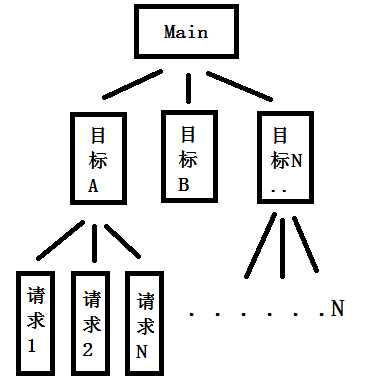
由上图可以看出,该工具主要有3层树形结构,最底层是真实发出对目标url地址的请求,使用的Task,Task对于多核CPU来说效果更显著;在讲解例子前咋们先来看看配置文件对应的实体类:
1 #region 配置信息 2 3 public class MoToolConf 4 { 5 /// <summary> 6 /// 执行结果日志记录路径(全局,默认程序根目录) 7 /// </summary> 8 public string ResultLogPath { get; set; } 9 10 /// <summary> 11 /// 多个任务 12 /// </summary> 13 public List<MoTaskInfo> MoTaskInfoes { get; set; } 14 } 15 16 /// <summary> 17 /// 任务信息 18 /// </summary> 19 public class MoTaskInfo 20 { 21 22 /// <summary> 23 /// 请求方式,目前支持:httpget,httppost 24 /// </summary> 25 public string Method { get; set; } 26 27 /// <summary> 28 /// 请求地址 29 /// </summary> 30 public string Url { get; set; } 31 32 /// <summary> 33 /// 连接数 34 /// </summary> 35 public int LinkNum { get; set; } 36 37 /// <summary> 38 /// 参数(post使用) 39 /// </summary> 40 public string Param { get; set; } 41 42 /// <summary> 43 /// 执行结果日志记录路径(私有>全局) 44 /// </summary> 45 public string ResultLogPath { get; set; } 46 } 47 #endregion
httpget请求的配置
首先我们需要在根目录下找到配置文件:PressureTool.json,然后配置成如下get请求设置:
{ "ResultLogPath": "",//默认不设置,日志记录在根目录 "MoTaskInfoes": [ { "Method": "httpget", "Url": "https://www.baidu.com/", "LinkNum": 10, "Param": "", "ResultLogPath": "" }, { "Method": "httpget", "Url": "https://cloud.baidu.com/", "LinkNum": 10, "Param": "", "ResultLogPath": "" } ] }
httpget应该是最简单的请求方式了,如果你需要传递什么参数,就直接往您url上追加就行了,get请求方式是用不到Param参数的:
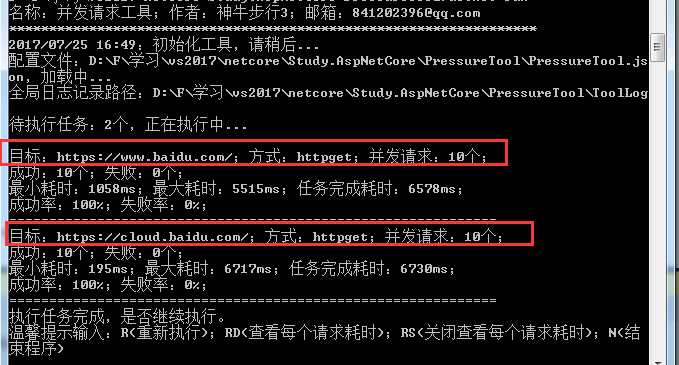
httppost请求的配置 - 参数为json
post的配置与get不同的是设置不同的Method参数( "Method": "httppost_json" ),并且如果你有参数那么还需要配置Param节点( "Param": "{\\"Number\\": 1,\\"Name\\": \\"张三\\"}" ),参考如下配置:
{ "ResultLogPath": "", //默认不设置,日志记录在根目录 "MoTaskInfoes": [ { "Method": "httpget", "Url": "https://www.baidu.com/", "LinkNum": 10, "Param": "", "ResultLogPath": "" }, { "Method": "httppost_json", "Url": "http://localhost:5000/api/Values/PostJson", "LinkNum": 1, "Param": "{\\"Number\\": 1,\\"Name\\": \\"张三\\"}", "ResultLogPath": "" } ] }
这里为了测试我写了一个简单的api接口,分别接收json和xml的参数,测试api接口代码如下:
1 [Route("api/[controller]/[action]")] 2 public class ValuesController : Controller 3 { 4 public static List<MoStudent> _students = new List<MoStudent>(); 5 6 // GET api/values 7 [HttpGet] 8 public async Task<MoBaseResponse> Get() 9 { 10 11 return new MoBaseResponse { Data = _students }; 12 } 13 14 // GET api/values/5 15 [HttpGet("{id}")] 16 public string Get(int id) 17 { 18 return "value"; 19 } 20 21 // POST api/values 22 [HttpPost] 23 public MoBaseResponse PostJson([FromBody]MoStudent student) 24 { 25 var response = new MoBaseResponse() { Msg = "添加失败" }; 26 if (student == null) { return response; } 27 28 _students.Add(student); 29 response.Msg = "添加成功"; 30 response.Status = 1; 31 32 return response; 33 } 34 35 [HttpPost] 36 public async Task<MoBaseResponse> PostXml() 37 { 38 var response = new MoBaseResponse() { Msg = "添加失败" }; 39 var strReq = string.Empty; 40 using (var stream = Request.Body) 41 { 42 using (var reader = new StreamReader(stream)) 43 { 44 strReq = await reader.ReadToEndAsync(); 45 } 46 } 47 48 if (string.IsNullOrWhiteSpace(strReq)) { return response; } 49 50 var match = Regex.Match(strReq, "<Number>(?<number>[^<]+)</Number>[^<]*<Name>(?<name>[^<]+)</Name>"); 51 if (match == null || match.Groups.Count <= 0) { return response; } 52 53 var student = new MoStudent(); 54 student.Number = Convert.ToInt32(match.Groups["number"].Value); 55 student.Name = match.Groups["name"].Value; 56 _students.Add(student); 57 58 response.Msg = "添加成功"; 59 response.Status = 1; 60 return response; 61 } 62 } 63 64 public class MoBaseResponse 65 { 66 public int Status { get; set; } 67 68 public string Msg { get; set; } 69 70 public object Data { get; set; } 71 } 72 73 public class MoStudent 74 { 75 public int Number { get; set; } 76 77 public string Name { get; set; } 78 }
我们往测试api地址 http://localhost:5000/api/Values/PostJson 发出请求,传递学生基本信息参数,然后通过api的get接口看看效果:
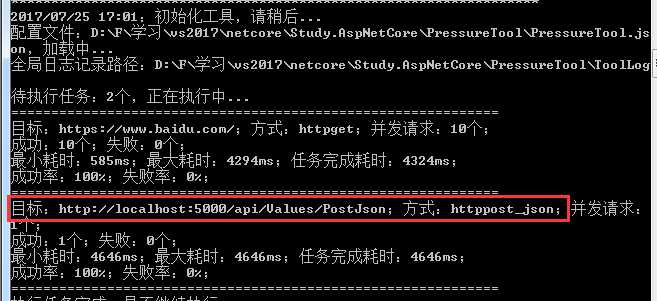
这里演示的只请求一次api,如果你想测试你自己api接口并发情况,你可以设置参数: "LinkNum": 10 或者跟多:
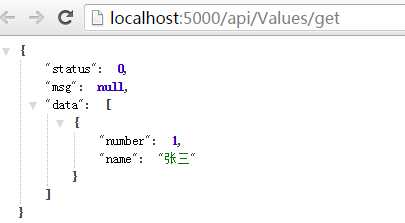
httppost请求的配置 - 参数为xml
post方式传递xml参数的配置和json差不多,需要注意的是需要修改Method( "Method": "httppost_xml" ),因为工具吧xml和json的配置区分开了,下面来演示下json和xml分别配置5次请求数的效果:
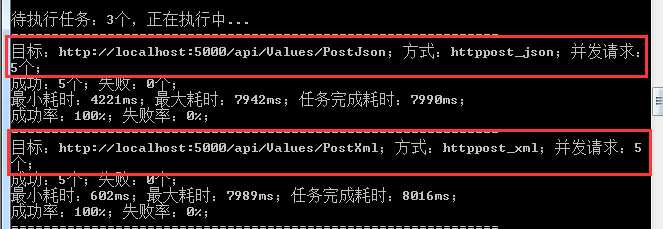
然后通过api的get接口获取下效果:

好了到这里演示就完了,如果您觉得该工具可以你可以去git源码:https://github.com/shenniubuxing3/PressureTool ,或者加入 NineskyQQ官方群:428310563 获取Framework版本的工具。
以上是关于开源个.NetCore写的 - 并发请求工具PressureTool的主要内容,如果未能解决你的问题,请参考以下文章